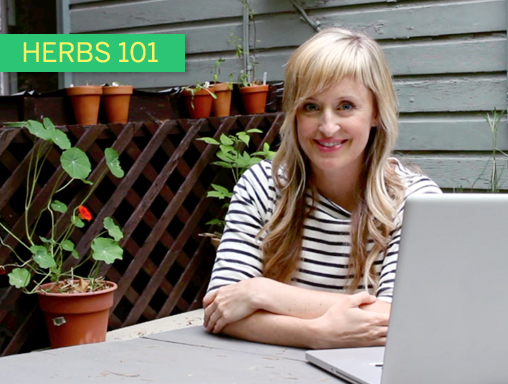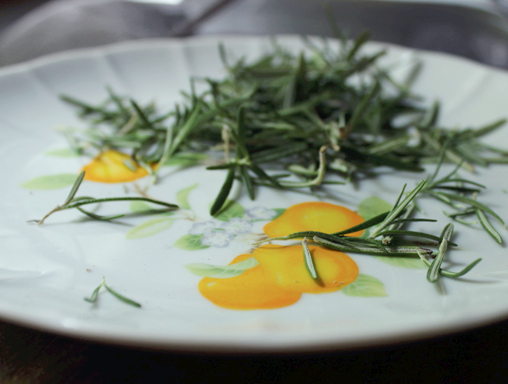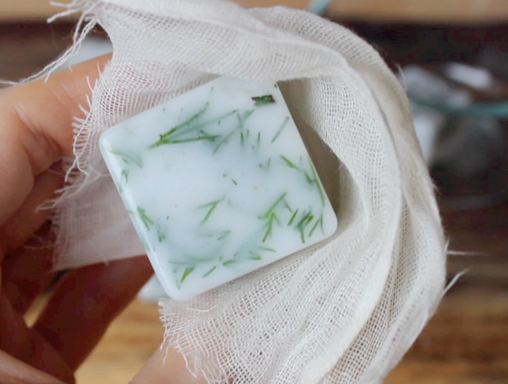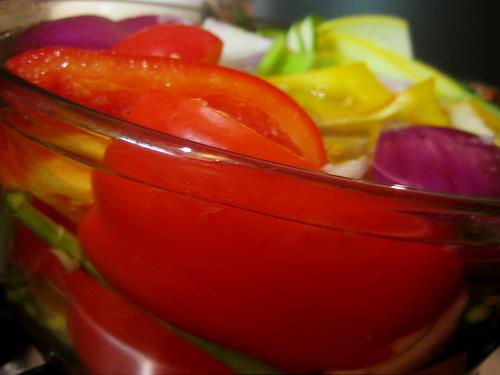Today, I want to answer a question sent in from community member Hoda.
Hoda writes…
Hi Heather,
I learned about YumUniverse from DailyCandy. I loved their Fridge Tour video with YU and all the tips you offered for keeping greens fresh. However, I was floored at the amount of herbs in your fridge drawer. WOW! How long do they last? And how do you keep them fresh?? I don’t buy that many fresh herbs, because they go bad before I can fully enjoy them. What’s your secret?!
– – –
This is a fun question, but first, hit the pause button in that DailyCandy video (watch vid above) when I open the drawer with herbs—there’s an awful lot of kale in that crisper, too. While I love fresh herbs, it’s not all herbs in my crisper drawer. I like to keep a small handful of a variety of herbs on hand in the kitchen—about the amount you’d get in a pack at the health food store or Farmers’ Market. And like kale, most of them keep longest in the crisper drawer.
To save money, make sure I’m always stocked up, and to insure that the herbs I’m using are clean and organic—I grow my own—bringing a handful at a time in from the garden.
Not not to worry though, if you don‘t have a garden, or access to a garden, you can easily grow herbs on a sunny windowsill in your home and pick what you need when you’re ready. This saves tons of money and makes it so much more convenient to prepare nutrient-rich meals from scratch. Just head to the Google or Pinterest and search for Windowsill Herb Garden and let the inspiration begin.
Storage:
I do a variety of things to keep picked herbs fresh depending on what I’m cooking for the week. And sometimes, I’m surprised by how certain woody herbs like rosemary and thyme can last for three, even four weeks in the crisper drawer.
What’s fun about the answer to Hoda’s question, is that basil, dill, marjoram, parsley, cilantro, chives, thyme, rosemary and stems of sage can be stored like flowers. Just trim the stems off at the end when you get them home and place them in a glass with about 1” of water. Just enough to hydrate them, you don’t want soggy stems. They will keep on the counter for about 1-2 weeks. You can also store all herbs in water like this in the fridge, or without their little vase, in bundles in the crisper drawer (like you see in the Daily Candy video).
Basil goes bad the soonest in the fridge (in about 1 week)—it prefers room temperature, and I always have the best success growing it indoors (although I hear it can do quite well outdoors). If I have fresh picked basil on hand, I usually prepare recipes using the basil earlier in the week and save the heartier herbs like rosemary, sage and thyme for recipes later in the week.
When storing in the fridge, make sure the herbs can breathe, take them out of plastic bags and if they are in a little plastic box, make sure you leave it cracked open.
Contrary to what you may have heard, you don’t want to keep herbs trapped (or wrapped) in moisture, so only rinse them right before using in a recipe. And don’t pick the leaves off until you are ready to use them—with each cut you make to your herbs, you diminish their vitality.
If you think you’ve overbought/overpicked:
Use this as an opportunity to start experimenting by adding herbs to more recipes throughout the week and definitely use them in smoothies. Try a simple mixed greens smoothie with unique combinations like:
• Apples, pear or quince with rosemary
• Cilantro with pear or mango
• Thyme with strawberry, blackberry or blueberry
• Sage with honey and cherries or sage and apple
• Basil and strawberry go quite well together (oh yes, add a squeeze of lime)
You can place herbs like rosemary and thyme in a pot with lemon and vanilla bean and some water. Simmer for a chemical-free potpourri—the fragrance will fill the house.
And if you just didn’t get to use your herbs in time—hey busy happens to us all—and a few leaves in your bundles are starting to turn brown/black, pick off the fresh leaves and place them on a dry plate in a cool, dark part of the kitchen for a few days—they will dry out. You can then save them in an airtight glass jar and use them up next week or next month—and you can feel good knowing that A.) you dried them yourself, and B.) you didn’t waste them.
Create dry seasonings mixes like rosemary, thyme and sage—store them in your pantry, or gift them to lucky recipients.
You can use them for teas, not just for flavor, but for healing and balancing.
The medicinal qualities of culinary herbs are awesome.
• Rosemary: antidepressant, soothes nerves, boosts memory
• Thyme: soothes menstrual cramping, laryngitis, combats tooth decay
• Sage: calms anxiety, lowers blood sugar, reduces perspiration
• Mint: relieves indigestion, heals the liver, improves blood circulation
• Basil: fever reducer, kidney booster, headache remedy
• Dill: heals the digestive tract, alleviates insomnia, allergy relief
This is just the tip of the iceberg, but you can’t go wrong.
And when all else fails (busy people listen up):
You can grab an ice cube tray and fill each compartment with 1-2 tsp of roughly chopped herbs or herb combos and then fill the trays up with unrefined, virgin coconut oil that has been gently warmed to liquid on the stovetop (no microwave). Pop in the freezer for about 20 minutes, and once frozen, transfer these ready to use oil/herb cubes to an airtight glass container and store in the fridge. You only use the freezer to harden your cubes and then store in the fridge once solid to avoid possible freezer burn. They keep in the fridge for almost ever.
This is a great way to make quick nutrient-rich dinners by jazzing up chickpeas, quinoa and/or buckwheat tossed with veggies. Just chop up the veg you have around, mix with some cooked legumes or quinoa or buckwheat, add your herb cubes and a one pot dinner is ready in 10-20 minutes.
Oh, one more tip for YU:
Save herbs, stems from herbs, and even use “wiltier” herbs for homemade veggie stock—just put them in the freezer until you have enough scraps to cook up with veggie scraps for some homemade stock.
Once your stock is prepared, you can also freeze into cubes for smaller portions like the oil cubes (but those stay in the freezer once solid).
And remember—it’s nature—real food is supposed to decompose, so the compost bin is another great place to put herbs that didn’t quite make it. At least they will go back into the earth to grow more food.
Visit us at our new home: Good Food Cooking School





